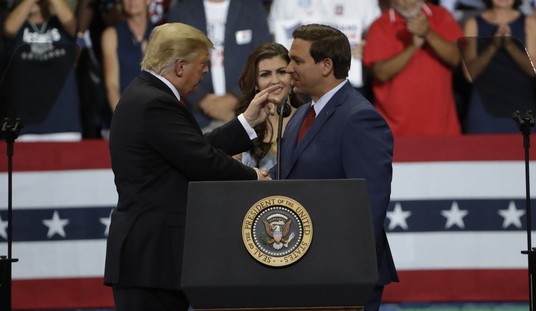CNN’s Candy Crowley interviewed Sen. Rand Paul (R-KY) on the debt-ceiling increase and the issues of government spending, and got perhaps a mild surprise for an answer. Yes, Paul will vote to raise the debt ceiling — but only in exchange for a balanced-budget amendment that ends deficit spending in Washington. Furthermore, Paul rejects the notion that a compromise on the budget involves raising taxes. A compromise means that conservatives will have to give up some defense spending as liberals give up some social-policy spending. Under no circumstances should Washington be trusted with even more money:
CROWLEY: I want to just add that the president has said in recent interviews that his vote against raising the debt ceiling was a political vote by a novice senator and he regrets it. But moving you along here, if — it just seems completely unlikely to me that there will be a vote for a constitutional balanced budget amendment. It seems unlikely to me that the president would agree to just use existing funds to pay off the interest on the debt. Seems to me that the only way this is going to go is that there will be the prediction (ph) of a bill to raise the debt ceiling. So if there is that, could you see yourself just voting no and letting it go at that, or would you stop at any means?
PAUL: I think we haven’t yet determined what our strategy will be, but I can tell you that the people of Kentucky elected me to shake things up. They didn’t elect me to raise the debt ceiling. They didn’t elect me to pass budgets that add — you know, the president’s budget will add $7 trillion to the debt if you believe his numbers. But whatever the numbers are, our government and our leaders are still adding enormous amounts of debt, heaping this burden on our kids and our grandkids. It is precisely why I was elected, to oppose this type of behavior.
CROWLEY: As you know, there is a so-called gang of six on the Senate side, three Republicans, three Democrats, trying to come together to come up with a bill that could pass, that would deal with the debt that you’re talking about here. Because the president has a plan, House Republicans have a plan, there’s not a lot of middle ground there other than everybody thinks — everybody says we’ve got to cut the deficit. I want to read you something that Senator Tom Coburn, a fellow Republican from Oklahoma said about these negotiations and about how to bring down the deficit — the debt. And he said. “I agree that we ought to cut spending. But will we ever get the spending cut to the level that we need without some type of compromise?” He’s talking tax increases here. Can you see yourself agreeing to a tax increase to help with this debt that you’re so concerned about?
PAUL: Yeah. I think there is a compromise. But the compromise is not to raise taxes, the compromise is for conservatives to admit that the military budget’s going to have to be cut. We’ve doubled military spending. I believe in a strong national defense, but conservatives will have to compromise and we will have to cut military spending. Liberals will have to compromise and we will have to cut domestic welfare. The compromise is where we cut, not where we raise taxes. The problem is, if you give them more money in Washington, they’re not to be trusted. I mean, there was $100 billion in last year’s budget that is unaccounted for. They don’t even know where the money was spent. Recently when we bailed out the banks in our country, guess who got bailed out? The Libyan National Bank. It was a pass-through. AIG became a pass-through for foreign banks. We don’t know where all of our money is going to be spent.
When I want to turn in money for my office, I want to turn a couple hundred thousand dollars back in that I’m not going to spend? It is unclear where that money goes. We cannot even be confident that the couple hundred thousand I want to give back goes towards the debt. Our government is out of control. They don’t need more money, we need to give them less money.
Expect to hear more of the argument that Republicans agree with Barack Obama — circa 2006, though, not 2011, on debt ceilings. Crowley notes that the White House now says that Obama regrets the vote, and it’s clear that he does, but for all the wrong reasons. Republicans have a good argument in this case that a vote against a debt-ceiling hike is a mainstream and not extreme position, but that enabling trillions more in deficit spending is not just extreme but also extremely dangerous. For the White House to argue otherwise is to admit that Obama really was the emperor who wore no clothes in 2006, just a year before he claimed to have all the expertise necessary to be President of the United States.








Join the conversation as a VIP Member